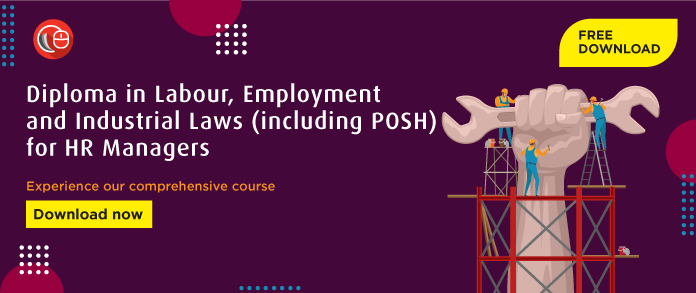This article is written by Harmanjot Kaur and the article has been edited by Khushi Sharma (Trainee Associate, Blog iPleaders).
History repeats itself, first as tragedy, second as farce – Karl Marx
There have been 1,007 reports related to local trafficking in 2016, and 994 in 2017. Since then, we observe the trend is constantly increasing at an exponential rate. Similarly, the areas related to the regulated working hours, human dignity and good working conditions with requisite safety equipment are often ignored.
Those who cannot remember the past are condemned to repeat it. With these lines of Hegel today we see today’s Farm Laws again turning into a thunderbolt. Here are some of the rights and landmark judgements for the protection of labourer classes.
Table of Contents
What are the landmark judgements of Labour Law
To protect the rights of workers from their exploitation here are some of the landmark judgements related to labour laws. In the case of TK Rangarajan vs Govt. of Tamil Nadu, it was held that there is no fundamental right for the government officials to go on a strike. Similarly, in the case of BR Singh vs Union of India, it has held that the constitution does not guarantee the ‘right to strike’ as a fundamental right. Similarly, in the case of Mangalore Ganesh Beedi Workers vs Union of India, it was held that even the beedi workers can have the right to freedom of trade and business. They have the right to form an association as explained under article 19(1)(g) of the Indian Constitution.
In the case of Rangaswami vs the Registrar of Trade Unions, it was held that the withholding of registration of a Trade Union even when the documents were complete was discriminatory. However, in the case of Tamil Nadu Non-Gazetted Government officers Union vs The Registrar of Trade Union, it was held that the government servants engaged in sovereign activities cannot be permitted to form trade unions. The government servants who form the force controlling the disciplinary actions or the governance and law would be disqualified to go to strike. This means that not all officials forming as part of the government officials would be disqualified. This was clarified in the case of Registrar of Trade Union vs Government Press Employees Union. Here, it was held that the officials working in the printing of official gazettes were permitted to form trade unions. Hence, they could avail themselves of the benefit of forming a trade union. Similar it does not matter how menial the work would be, but the people have the right to form the trade union. This was held in the case of Trimala Tirupati Devasthanam vs Commissioner of Labour. Here, it was held that even the people working in the power and water wings of the organisation would be allowed to form trade unions.
What are the landmark judgments regarding trade unions?
In re Inland Steam Navigation Workers’ Union, it was held that the registrar must register the trade union in case all the requirements are fulfilled. No one can deny the right to get registered unless reasonable grounds are presented for the same. However, the fact cannot be denied that merely not getting registered would make a union an unrecognised entity. This was held in the case of Chairman, State Bank of India vs All Orrisa State Bank Officers Association.
Can a trade union be liable for criminal conspiracy?
In the case of RS Ruilkar vs Emperor, it was held that a trade union cannot be held liable for the conspiracy to do certain acts in furtherance of the trade union. Similarly, in the case of Rohtas Industries Limited and another vs Rohtas Industries Staff Union and Others, it was held that the workers cannot be asked to make good of the loss suffered by the employer because of the illegal strike.
Can the workers protest within the premises of their employers?
In the case of Standard Chartered Bank vs Chartered Bank Employees Union, it was held that the workers cannot have demonstrations in the premises of the employers. One cannot tie banners in the place of the employer. In other words, it can be said that the lobbying or picketing shall be done outside the premises of the employer.
Is there any restriction on the strike of the people working in the services of public utility?
Yes, in the case of Common Cause vs Union of India & Others, it was held that under the Consumer Protection Act, 1986 it was found that the strike was launched by the Indian Flight Engineer’s Association which was illegal. It was held that since flight officials form a part of the public utility services. Therefore, their strike without prior notice was held to be illegal in nature.
What is the scope of industry under the ‘Factories Act’?
In the case of Banglore Water Supply and Sewage Board vs Rajappa, 1978 it was held that the scope of ‘industry’ is not limited to the industry’s premises. It includes gymkhanas, dhanrajgiri hospitals, cricket clubs as well. This case also discusses the ‘dominant nature tests’, which is defining the terms such as workers and industry. Similarly, the running of a tube-well owned by the government was defined as an ‘industry’ in the case of Gurmail Singh vs the State of Punjab. Similarly, in the case of All India Radio vs Santosh Kumar, it was held that the ‘All India Radio’ was defined as an industry under Section 2(j) of the Act.
Likewise, in General Manager, Telecom vs A. Srinivasa Rao and In Sub Divisional Inspector of Postvaikan vs Theyyam Joseph, the telecom department of the union of India was held to be an industry.
Can a research laboratory be held as ‘Industry’?
In Physical Research Laboratory vs KG Sharma, it was held that research laboratory is not an ‘industry’. It was held that a research organisation is discharging purely the governmental functions. It can be defined as a domestic enterprise than a commercial enterprise. However, it also requires the corporation of the employees to achieve its purpose.
Can an enterprise for the promotion of art and culture be held as an industry?
In the case of Bharat Bhawan Trust vs Bharat Bhawan Artist’s Association, it was held that a trust promoting art and culture is not defined as ‘industry’. The basic definition includes some inclusion of production of a commercially viable entity, manufacturing or processing of goods. However, this is not true in the case of an enterprise just promoting art and culture. However, on the contrary, in the case of State of UP vs Jai Bir Singh it was held that for welfare schemes, the water and sanitation departments would constitute as industries.
Whether a dispute with a person who is not a workman falls within the scope of an industrial dispute?
In the case of Workmen of Dimakuchi Tea Estate vs Management of Dimakuchi Tea Estate, it was held that in the definition clause of Section 2(k) of the Act, the term ‘any person would include a person who is either an employee or a non-employee. Hence, even a non-employee would fall in this category.
What are the provisions for the women employee regarding employment?
In the case of Municipal Corporation of Delhi vs Female Workers (Muster Roll), it was held that those who were employed on the muster roll for carrying on the activities were termed as employees. Even the workers included in the repairing of roads and digging of trenches would be included in the definition of employees. Regarding the women employees, it was held that the women workers should be given the maternity benefit. The period is also defined here. It is said to be a period of mature pregnancy or soon after the delivery of the child.
Can an employee fight his case regarding undue stoppage of promotion?
Yes, in the case of J H Jadhav vs Forbes Golak Ltd, it was held that in case of undue stoppage from the promotion claim of a clerk. This can be sought under Section 2(k) of the Industrial Dispute Act, 1947.
Can teachers be regarded as workers as per the Labour Laws?
In the landmark judgement of Miss A. Sundarambai vs Government of Goa, Daman & Diu, it was held that an educational institute is an industry. But the teachers cannot be treated as workers. It was added by the Hon’ble Court that the term workmen include semi-skilled or unskilled people not having expertise as teachers. It was held that teaching is a noble profession. It is not attributed to manual work, supervisory work or some clerical work for that purpose.
How can a workman be defined in the Industrial Dispute Act?
In the case of HR Adhyanthaya vs Sandoz India Ltd., the parameters were set to qualify whether a person is termed as a worker or not. In this case, it was held that a worker is defined as someone doing unskilled, manual work, clerical work for hire or reward, manual, supervisory, technical or operational work for reward or hire. If these parameters are fulfilled then a person is defined as a worker.
In a similar way, in the case of May & Baker (India) Ltd. vs Workmen, AIR 1967 it was held that medical practitioners are not termed as workers since it is a noble profession. Likewise in the case of Western India Match Co. Ltd. vs Workmen Popularly known as the Vimco case, it was held that a person in the sales department would not qualify as a ‘worker’ under this Act. Clarifying the previous judgement, in the case of Buniah Shell Oil Storage & Distribution Co. of India Ltd. vs Burntah Shell Management Staff Association, 1971 it was held that the person promoting sales would not qualify as a worker. This is because, there is no technical, clerical or supervisory work in promoting sales. Thus, it would not amount to qualify as a workman under the Industrial Dispute Act, 1947.
Can the status of managerial or supervisory work help to establish jurisprudence?
In the case of S K Sharma vs Manesh Chandra, 1983 it was held in this case that in case a worker is not engaged in any administrative or managerial work, he would be qualified as a worker under this Act. Similarly, in the case of Ved Prakash Gupta vs Delton Cable India Ltd. it was held that since a security inspector at the security gate is not doing a managerial or supervisory action, he would not be qualified as a worker, in this case. In the same way, in the case of GB Pant University of Agriculture & Technology vs the State of UP, it was held that the worker of a cafeteria was held to be an employee of the university.
Can we readily revert to strike, in case the demands are not met?
The Hon’ble Court replied negative stating that one should first try to mediate the matter peacefully. The idea of doing a ‘strike’ should be the last resort in such a case. In the case of the Management of Chandramalai Estate Ernakulam vs its workmen, it was held that it is not the right of the workers to commence a strike without trying to mediate the dispute peacefully beforehand. It is only after exhausting the peaceful methods of achieving the reasonable avenues that one should go for a strike.

What are the areas that an employer can take to resort things to normal?
In Kairbetta Estate Katagiri vs Rajamanikam, it was held that just as labourers and workers resort to strike for the fulfilment of their demands; similarly, the employers can use lockout as one of the means to fulfil their demands.
Besides this, it has been pointed out that strikes cannot be illegal and justifiable at the same time. In re India General Navigation case, it was held that it would be justified if the employer deducts some salary for the period of the strike as a disciplinary action.
What is retrenchment? What are the established case laws regarding the same?
During an economic slowdown or due to an increased number of employees, the employer tries to scrap some of the employees. This is known as retrenchment. In the case of Punjab Land Development & Reclamation Corporation Ltd. vs Presiding Officer, Labour Court the learned counsel for the employers contended the definition of the term ‘retrenchment’. Section 2(oo) of the Act says that ‘retrenchment’ is the means for the termination of service of workman only by the way of surplus-labour, or by any other reason whatsoever.
In the case of Uptron India Ltd vs Shammi Bhan, it was held that a mere punishment as a consequence of disciplinary action would not amount to retrenchment.
What is Undertaking? What is its relation with Labour Law?
An undertaking is a concept narrower than an industry. It is more of something related to the government projects of building roads, bridges, railways etc. However, in the case of SM Nilajkar vs Telecom District Manager, Karnataka, there was a landmark judgement in the same area. The closure of government projects or schemes would attract the provisions of S. 25 fff(i).
The question which was contended was whether the termination of an undertaking contract attract compensation?
It was answered by the court that the expression of the term ‘retrenchment’ here means that the termination by the employer of the service of a workman or any other reason whatsoever, is used in the term ‘retrenchment’. However, the Hon’ble Court contended that the termination would not amount to retrenchment within the meaning of the sub-clause (bb) if the following conditions are fulfilled:
1] The scheme was employed in the project or a scheme which is of a temporary duration.
2] It was a daily wages solicitor, inter alia that the employment would end at the time of the expiry of the scheme.
3] The employment came to an end at the time of termination of scheme or project and consistently within the terms of the contract.
What is its relationship with Criminal Law?
Human Trafficking
Research has shown that the maximum amount of modern slavery is prevalent in India. Similarly, it has been found that instances of slavery have tripled in the past few years. Merely, making the laws under the Indian Penal Code or Labour Law is not sufficient. There should be active steps taken for curbing the menace of slavery. This is not only a violation of the right to life with human dignity, but also it curtails various rights pertaining to the Universal Declaration of Human Rights.
Force and Criminal Force
There are various instances where the workers are not treated fairly. According to statistics by International Labour Organization 24.9 million people were in forced labour. Similarly, according to a survey conducted by ILO, it has been found that an estimated 15.4 million people were living in a forced marriage.
Sexual Harassment of women at workplace
The landmark judgement of Vishakha vs the State of Rajasthan presents this evidence that today, the instances of sexual harassment of women at the workplace are increasing exponentially. A recent survey has found that 63% of women did not file a complaint. Similarly, 79% kept the issue to themselves. This shows that there is a need to have gender-neutral laws all over the world. This includes, the jokes having sexually coloured remarks, inappropriate innuendo, sexual assault and even inappropriate touching. Similarly, asking for leave during periods is a devastating task keeping an eye on the circumstances. Also, it has been found that 7 out of 10 companies do not take sexual harassment cases seriously.
Kidnapping
According to a study, it has been found that more than 460,000 children go missing every year. Out of this, 43% of global kidnappings that occur for ransom occurred in Asia only. Mostly, the severely affected people are those coming from downtrodden societies. They are at the mercy of help from the PIL filers and the activists due to a lack of resources and unawareness about the areas related to law and justice.
Additionally, it has been found that due to corruption the underprivileged people are not able to get the benefit they actually should have.
In the light of the above discussion, it has been found that the provisions regarding labour law are not known to most people. Similarly, there are areas related to the upliftment of the downtrodden classes that are implemented at the mercy of various officials. One idea can be of including Universal Basic Income. However, it could be accompanied by the notion of indolence, laziness and lack of motivation. Therefore, it is the need of the hour to critically think about the issue at hand. Otherwise, it won’t be late for the next Marxist movement to start mushrooming in the light of the latest Farming Laws!
LawSikho has created a telegram group for exchanging legal knowledge, referrals and various opportunities. You can click on this link and join:
https://t.me/joinchat/J_0YrBa4IBSHdpuTfQO_sA
Follow us on Instagram and subscribe to our YouTube channel for more amazing legal content.
 Serato DJ Crack 2025Serato DJ PRO Crack
Serato DJ Crack 2025Serato DJ PRO Crack










 Allow notifications
Allow notifications


